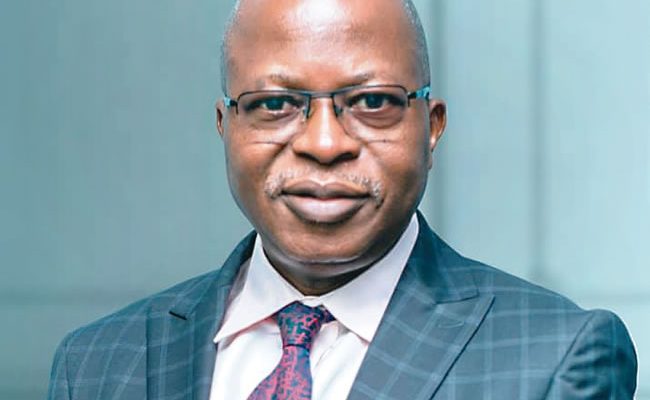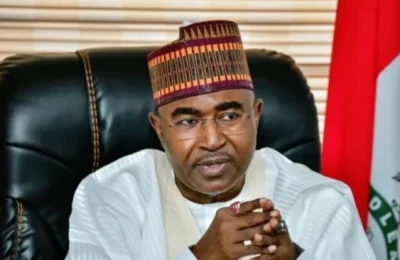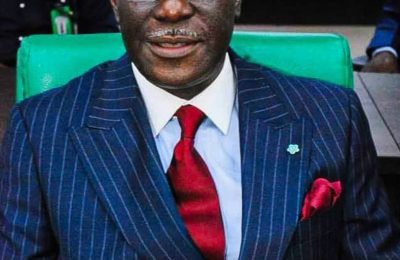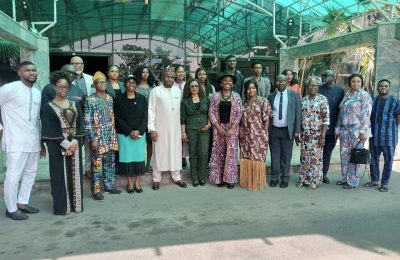
Mr Olaniran Olatona, a chartered accountant and Fellow of the Institute of Chartered Accountants of Nigeria, is the chairman, Ekiti State Internal Revenue Service (EKIRS). He speaks with ‘YOMI AYELESO on how a state known for its poor internally generated revenue is gradually shedding that toga, the impact of good governance that has encouraged Ekiti residents to become more tax compliant and the tax reform bills currently before the National Assembly, among other issues.
EKITI State has recorded significant progress in its internally generated revenue, especially this year, which has attracted commendations from the State Executive Council. How did your office achieve this?

Quite a number of things cumulated into the achievement and we could even do more. When I joined in 2022, we were making N600 million and sometimes N650 million per month and it is on very rare occasions, maybe January, that the revenue was hitting N700 million. But now, consistently, we are hitting N1.5 billion on a monthly basis. Part of what caused it was the reform that took place. We are now fully autonomous. Of course, bringing some of us who are professionals has significantly helped us, because we don’t run like a typical public sector organization. We run with the private sector mentality of swim or sink and my background is such that I always strive to exceed expectations. I will say the reforms have been helpful and we must thank the former governor, Dr Kayode Fayemi and the current governor, Biodun Oyebanji for their foresight to let the Ekiti Internal Revenue be autonomous. Autonomy means that we are free from government interference and we can work and what we achieve determines what we also get. It was tough starting because quite a number of my colleagues were afraid that if we requested for the autonomy, we won’t be able to pay salary because as of the time I came, government was still paying salary but I was able to motivate them and let them reason along that we can do it. We were supposed to start June 1st , 2023 but the Commissioner for Finance (Akintunde Oyebode) recommended to the governor to let it start April 1st, 2023; that put us on pressure because we knew that if we didn’t get to a certain level, we would not have enough money to pay salary.
What are these reforms you mentioned that have helped you to record the remarkable progress in the state’s IGR?
One of the things I have noticed is that an average Ekiti person is very ignorant when it comes to taxation. We are educated and enlightened, but we are ignorant when it comes to taxation. People don’t take time to study the law that surrounds taxation, but it is easy to just talk and condemn that we are making life difficult for them. The level of exposure also affects us so much. Part of what we are thinking of doing is to continue to engage and sensitize, enlighten, and come down to the people’s level. Some associations have come to us so that we can allow them to pay as a group but we explained to them and some of them now have an understanding. What we are collecting is not association’s income money; we are collecting company’s income tax. What we are collecting is personal income tax. Those that always gang up and say they belong to a particular association, we will keep on telling them that we want to deal with them at an individual level which will help and guide them tremendously.
What are the measures being put in place to ensure transparency and accountability in your activities?
We are trying to reduce human interference and that is to say, you want to pay and you give money to people to pay on your behalf and that lock-chain is an opportunity for corruption. We have put in place lots of things and resources, especially in the area of technology. As of the time I came, if you paid in Omuo-Ekiti, you won’t collect your receipt until somebody comes to Ado-Ekiti, the state capital, to pick it up. But now, if you pay anywhere, you can get your receipt printed out for you. Aside from that, we are asking people to pay to the banks, but, sometimes, banks will not open which makes us introduce some ways of paying through the internet with a debit card. You can also pay through point-of-sale (PoS) terminals. When we discovered that quite a number of people don’t have internet-enabled phones, we also introduced a USSD code which guides you on how to get your money paid. Through that one, you realize that you don’t need to say you give your money to someone and the money got lost. You can transact with us directly. You also need to understand my background. Most of the time, I have worked as an internal and external auditor; I am a forensics accountant and able to understand where loopholes are and we block them. We have not introduced any new tax since I came, but much of the efforts have been to block loopholes and prevent leakages. Once we did that one, the revenue that would have gone to individual purses began to go into the government purse.
What is your reaction to allegations of people that your personnel are intimidating and putting more burden on business owners and residents of the state through tax collection?
For someone who has been evading taxes, who has been dodging and we are now expanding our tax net to cover such to block leakages, there is no way they will like us. The total number of staff, direct and indirect, is not up to 500. We are collecting taxes from 5,000 to 10,000 people; it is natural that their voices will appear louder than our own. Let me give you an example, before now, somebody paid, got a receipt and wanted to collect tax clearance the following year and we needed to check what he paid in the previous year. The receipt he carried showed that he paid N1.5 million two times, making N3 million. But by the time we checked and traced it to our bank account, we realized that what was paid was actually N15,000 in two places. They collected N30 million and paid only N30,000 into the coffers. People doing that one will not be happy with you. We must say we must keep to the law. The law says aside from asking for a tax clearance certificate, you must let the Internal Revenue also have a say, show them that tax clearance certificate, let them confirm whether it’s authentic or not. People that already have printers, printing fake receipts, there is no business again for them, because once you want to do anything with the government, they will ask for tax clearance and those organizations have to contact us and we now check whether it [tax clearance] is our own or not, then confirm to them. That alone is helping us tremendously to caution [defaulters]. Another thing is that our own staff also are now highly motivated and they know that there is zero tolerance for such. When you are entering my office, you would have seen the disclaimer that someone who didn’t remit the tax will lose his/her job and we will also put their pictures on our websites and everywhere to alert people not to deal with such people again. That alone provides a moral check for some people that may be facing similar temptations in the future. Of course, part of it is that when the management is also showing some high level of transparency, those following us will want to show it. When the staff are not denied their salaries, and they know that there are incentives when they do well, they are encouraged to rather do well, face their business rather than thinking about how to steal. About the allegation of making life difficult for people, we don’t want to make life difficult for people, but what happens is that many of our people are still not knowledgeable enough. When a tax man comes to you, it is either you have a record or you don’t have. If you have, they will ask for it and if you give them the information needed, they will use that one to assess your tax payment. That money might be hard for you but the law permits you within 30 days of receiving the assessment to come to Internal Revenue and discuss with tax officers for re-evaluation provided you bring evidence that you don’t make such profits in your office and it will be reviewed.
Is there any correlation between good governance and tax compliance?
Let me say that we thank God for Governor Biodun Oyebanji. He came here (our office ) in the first quarter of 2023 unannounced to thank me and assured me that the revenue I am generating would be efficiently used for the good people of Ekiti State. I have travelled a lot in the last two or three months and I have always had to answer questions on how the governor is doing it in the state. Tax is a compulsory imposition by the government on the people and it must be stated that you can’t enjoy the government to the level of tax that you pay. You can’t say a poor man who is paying N5,000 should not drive on the road. Ekiti is very fortunate this time with the kind of governor we have. The attitude, the accountability and transparency of the governor is helping us tremendously. Governor Oyebanji is doing well and people see where their money is going into. It is a fact that good governance will always help the tax collector. Sometimes, people expect the government to satisfy all requests. It is just like what happened in the Bible when Jesus Christ had to feed thousands of people. He served people the bread but it is not everybody who got the bread at the same time. It is turn by turn.
What is your take on the tax reforms bill currently before the National Assembly?
We are cracking the law already and looking at the benefits. But, as for me, it is a good thing, because I can’t be saying I’m harmonizing and Osun State is not doing it. It is better done by everyone of us across the country. It is a step in the right direction because it is going to make the high net-worth individuals pay more and it will reduce the burden on the poor people. The only area where I disagree a bit is the aspect of saying anybody that does not earn up to N800,000 should not pay anything. I believe that anybody anywhere that is earning something should pay, but the person earning N800,000 should not, in any way, pay more than somebody that is earning N8million. That’s one thing I think will be offensive. When you don’t contribute to a system, what mouth do you have to criticise the government? In Ekiti State Internal Revenue Service, we always tell people to pay their tax and task the government. If you are conscious that you have contributed money to build a government infrastructure, it will slow people down when they are being called out for riot and to destroy property.
The governor has submitted the 2025 appropriation bill before the House of Assembly and I would like to know your projections in terms of IGR for the 2025 fiscal year.
We are already doing it and we are hoping that by this time next year, we should be clocking N2 billion monthly in IGR. It could be earlier because it is a function of several things. The tax reform bills are coming; we can’t actually talk about the impact until it starts, but from what I have seen so far, it will lessen the burden on the poor and increase what the higher-income earners will pay. We expect more cooperation from the people as we are trying to also implement voluntary compliance and we also hope that more of our people will voluntarily comply because when they do what they are supposed to do, nobody will chase them. I also want people to know that in Ekiti State, we are not interested in killing their businesses. The governor is not putting me under any pressure to do my job, but we can still do more. I am not interested in achieving a huge target this year and make all the businesses dead by next year. If I tax you heavily this year and your business is affected, where will I get revenue next year? I prefer to be growing the revenue step by step. It is when people disobey and we do enforcement that the noise is all over. The people don’t know how many times we have tried to persuade. Aside from the government, we are also thinking of what we can do to some of the communities where we operate in terms of social corporate responsibilities so that people can benefit. Let me say that outside the state capital, we have erected a borehole so that people living around our offices in those council areas and communities can have access to water. We are thinking about how to do more for a number of our tax stations so that people don’t just see us when we want to collect money and we can contribute to the community. We are thinking of what we can do about schools in some of the areas we operate to help them on career talk, civic guidance, quiz and debate competition and give them awards so that people will see us more as friends and not as enemies. People need to know that the money we are making is not coming to Ekiti State internal revenue; it goes straight into the treasury account of the government. Our own is to bring in that money. When you pay, you are paying to the Ekiti State Government; you are not paying us.
READ ALSO: Massive turnout as Ayedatiwa/Adelami campaign hits Ondo West







